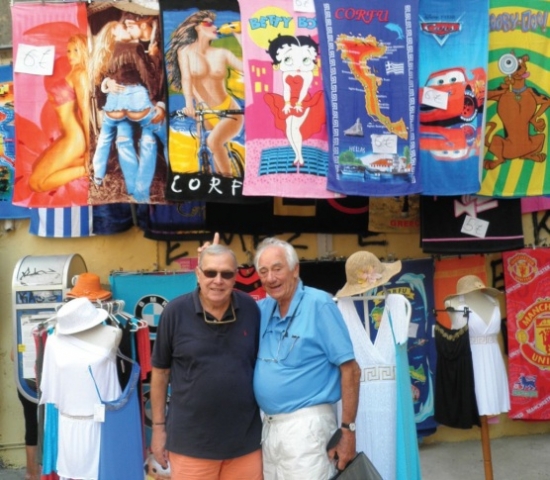
Strolling in down town Corfu - Hymie Kestan with Paul Kohn (right)
Thinking of getting away for a few days’ break? Then Crete, Cyprus or Rhodes may come to mind.
It so happened that our travel agent had recently been to Corfu, the Greek island on the Ionian Sea, and gave it a “warmly recommended” rating.
After a direct two hour flight from Ben Gurion Airport, four of us emerged in Corfu. Although it was early, a shuttle bus was there to take us to our hotel where a friendly staff saw to it that we got our rooms immediately.
The first things that struck us were the palatial common areas — spacious, spotless, and beautifully furnished. All the bedrooms and suites had balconies facing the sea where yachts and boats of every shape and color were part of the view. Huge cruise liners sailed by as the more sporting types parasailed or flashed by on water skis. With a sparkling swimming pool a few steps away and easy access to three beaches below, we knew we had arrived for a vacation.
We booked a half-board stay, which is advisable as in addition to breakfast you can choose to have either lunch or dinner in the hotel. For those who do not want to spend a week in the hotel only, the hotel provides guests with a voucher for free travel to and from Corfu town (Kerkyra), twenty minutes away and well worth visiting.
The town grew between fortresses and castles, going back to Byzantine times. Today it is a labyrinth of narrow alleyways packed on every side with shops. The tenement buildings, most of which could do with a face-lift, bear witness to the varied architectural styles of past centuries, and include beautiful arches and arcades. At every corner, restaurants, tavernas and cafes beckon you.
You wander along and come to an oval cricket field where, lo and behold, cricket is being played. Suddenly, out of nowhere, a big brass band marches through the wider streets and is followed by another one of younger trumpeters and drummers, all in white, giving it their all, to the delight of the locals and tourists.
Another surprise that hit us as we sauntered along the alleyways was a corner wall sign stating, “To the Synagogue,” accompanied by an arrow pointing the way. It was open and tourists were inside. Two women who spoke Hebrew were on duty and informed us that until World War II, 2,000 Jews had lived in Corfu. All were deported and only 180 returned after the war. Sixty Jews now live in Corfu, a Sephardi community. For the High Holy Days and other festivals, guest rabbis come from Israel. The synagogue is kept in pristine condition.
The island of Corfu stands in a strategic location at the entrance to the Adriatic Sea, and its conquerors have included Venetians, French, Russians, Turks, and the British. It also attracted artists and writers such as Oscar Wilde, Johann Wolfgang von Goethe, and Gerald and Lawrence Durrell, besides being an inspiration to Greek literary figures.
To see something of the island we hired a car. We drove along excellent roads but also along sharply winding lanes only wide enough for one vehicle. One can stop at villages and hamlets, each with its taverna, and the more adventurous can visit mountainside monasteries. The island is dotted with eye-catching privately owned villas.
Along the northern coast resorts, fishing villages, bays, capes and coves, all border the blue sea. On the tip of the island stands Kassiopi which is clearly adapted to absorb British visitors. All signs there are in English, often not even in Greek, to guide one to the beaches and enticing waterfront restaurants where fresh fish are a specialty.
On the west coast is one of the beauty spots of Corfu, Palaiokastritsa. In the nearby Ropa Valley, the island’s golf course is rated among the 100 best in the world. In the center of the island is the huge Aqualand water park, with 38 different slides. We made do with hiring a speedboat at the hotel to get us out to sea and feel the brine.
The population of Corfu is about 150,000. “But we have five million olive trees,” a proud local resident informed us. Greece may have serious economic problems, but its exceptionally friendly people, as in Corfu, will ensure that its islands continue to be a world tourist attraction.
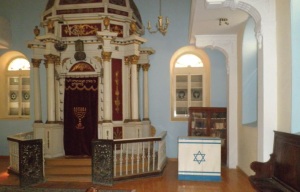
Synagogue in Corfu
 Milestones 168
Milestones 168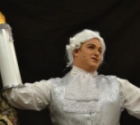 “Be our Guest” at Beauty and the Beast
“Be our Guest” at Beauty and the Beast Advertisers List
Advertisers List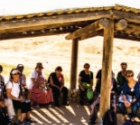 From Bible to Bedouins and Battles
From Bible to Bedouins and Battles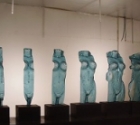 Trip to the Dead Sea
Trip to the Dead Sea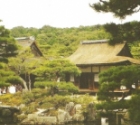 Japan
Japan Paul Kohn
Paul Kohn